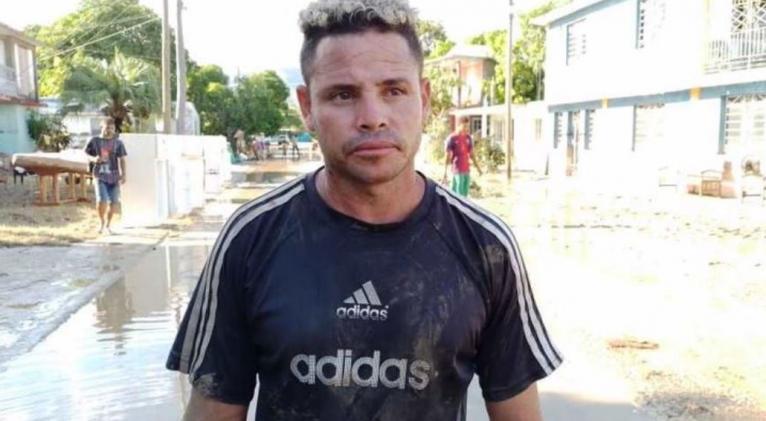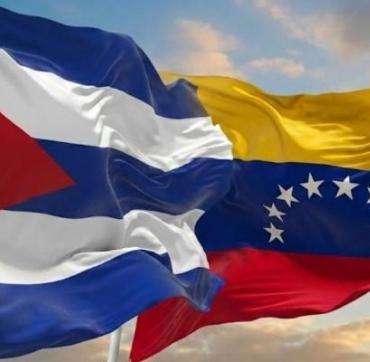A True Hero
especiales

Jonathan Frometa Navarro does not have the attitude of a hero, but he is one. He is not tall, but rather corpulent, perhaps shaped by his studies in physical culture and sports and his inclination towards underwater fishing. When we found him he was dressed in black, although his clothes were highlighted by a camouflage of mud that had not yet dried. He has a haircut that highlights a curly, blond hair on top, perhaps as a sign of his profession as a barber.
When called: “come, they are looking for you,” he walked ovcer barefoot from the other end of a street “paved” with water and mud. He approaches looking everywhere, as if looking for something he lost. Around him, a sad scene shows the neighbors taking furniture, equipment and all belongings out into the open, trying to take advantage of the sunrays that are already dwindling, to dry what was until that very day in the hands of the waters dyed with that dirty color of floods and ocean surges.
He greets us with courtesy and before the introduction of the two journalists, he gets nervous. “Calm down, buddy, we came to you because your neighbors say that when it comes to talking about saviors during floods that hurricane Oscar caused here, in San Antonio del Sur, on this block, you are the man to thank,” I tell him.
The effect is opposite to what I expected, his hands begin trembling. Knowing that he is recognized by the neighborhood, his gaze turns everywhere again, now I suppose he is looking in the sad eyes of his neighbors for those who put him in such a tight spot, when right now his intentions are to keep recovering things from his house and helping others.
He begins to speak with a broken voice, like someone who wants to tell, but not remember. From his eyes red from crying so much, new tears flow, he gets emotional and his hands tremble a little more while he rubs his neck, near his right ear, where a recent wound makes a furrow in his white skin, possibly received during the hustle and bustle of the previous morning.
“This hurricane was more damaging here than Flora hurricane, the water was dammed up and reached the height of roofs of many houses. We didn't know what was coming. It was despairing. From 2 a.m. the water was rising and it reached up to the knee and what we did was to raise things to a height of one meter, but at about 4 a.m. the big flood came. This was an entire river.
“With a group of young people I brought people from the block to my aunt's house upstairs, on the second floor, and from there I dove headfirst to look for the children. It was a hard night. When the Rescue and Lifeguard came, already in the daylight, I helped them get the vulnerable, adults and the elderly, out there,” he says while trying to contain her sobs and pointing towards the road that links the capital of San Antonio with the city of Guantánamo.
Another tense moment was when Jonathan swam to look for his daughter, who had been on a roof with a nylon rope over his head since the flooding began, and also when he went to help at a children's school on the beach, crossing the entire Reparto Cultura, where he lives, and La Plaza, partly swimming and other times walking, when the uneven ground allowed it, a way to rest his exhausted arms, but ready to continue fighting for the lives of his fellow countrymen, of whom he helped save around 50, between nine and 10 children and about 15 adults by himself.
“We had to break down the houses of people who were trapped, almost drowning, and couldn't get out. I couldn't get to everyone. It was hard,” he says with obvious pain that makes him swallow hard and look at the floor, as if looking for an explanation or strength to continue telling; he wipes his tears again, while in the eyes of the two journalists also appear some tears.
Jonathan says that the water took a while to subside, leaving behind a desolate panorama of mud and debris. Now he points to his house to illustrate the disaster. What was once a wall in the front is now just a mass of stone and metal thrown onto the sidewalk. Even the shutters tied with cables did not hold up. It took everything from the house and only the walls, roof and people's lives remained.
Now his gaze is aimless again and the brief trembling of his body returns. I put a hand on his shoulder, in an attempt to comfort him with a gesture when no words emerge that can encourage him. We almost remain silent. He moves to the sidewalk and I follow him with some clumsiness in the way that my lack of boots allows on that street-lagoon.
One last question comes out: "If your family was already safe, what prompted you to risk your life to save others?"
He takes a deep breath, now looks at the sky and fixes his gaze on me with eyes that, along with the pain, denote sincerity. He doesn't rush to answer, but when he does, he says it with a conviction that overcomes the nervousness that accompanied him almost the entire time of our conversation.
“I was driven by humanism and fatherhood, the need to help children who couldn't go out because their parents weren't there, women with children alone, older adults and even people who were trying to save their animals, whom we couldn't reach them all. I thank God that I'm alive, although it's difficult and I don't know if it's better to have to live through this.”
Taken from Venceremos newspaper
Translated by Amilkal Labañino / CubaSí Translation Staff














Add new comment